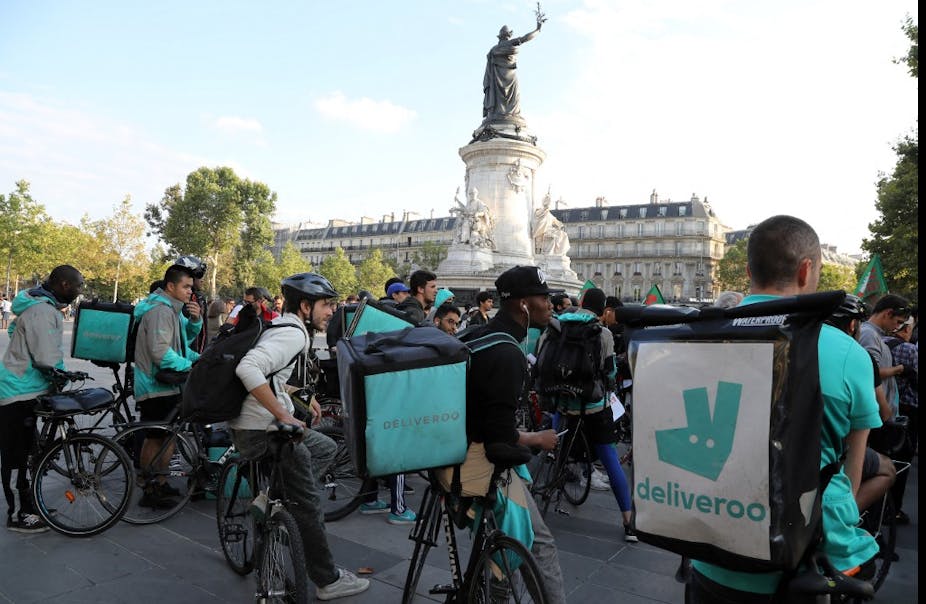When the gavel came down, the verdict of the first criminal trial targeting “uberization” in France was unambiguous. The court in Paris recognised the French branch of the London-based company Deliveroo wrongly classified riders who should have been considered employees as independent workers. Found guilty of “systemic concealment” of jobs, the firm was fined 375,000 euros – the maximum demanded by the prosecutor – and two former executives received one-year suspended prison sentences. Another executive was fined 10,000 euros for “complicity” in the scheme, and five labour unions who were plaintiffs in the case received 50,000 euros each.
It follows on the heels of the company’s loss in February 2020, when a judge ruled that Deliveroo was guilty of “skirting labour laws” and ordered them to pay 30,000 euros in damages to a delivery man.
The new ruling is a body blow to Deliveroo’s business model, in particular because it revealed how the company platform controlled workers. Testimony showed the existence of direct worker management by the platform’s algorithms and thus a subordinate relationship between riders and the firm. Evidence includes the constant monitoring carried out by geolocation and collection of data on rider performance. Together, they enable control over riders’ schedules and provide access to the most profitable food-delivery slots and distance-based pricing.
The court also pointed out the numerous obligations imposed on the delivery riders such as wearing a uniform or the attitude to have toward the customer or the restaurant owner; these instructions were reminded by regular e-mails, training videos and “trial shifts”. To the criminal court, the evidence presented demonstrated that Deliveroo is indeed the “boss” of these food-delivery riders, and that they were thus employees.
More broadly, Deliveroo’s conviction is a warning to all companies that operate on the same principle, and could potentially lead to the requalification of 5.5 million platform workers identified by the European Commission as “improperly qualified as self-employed”.
Today’s verdict represents a reversal of the French position on platforms. During Emmanuel Macron’s five-year presidency, there were attempts to establish a specific legal regime for online-platform workers, including the 2016 “El Khomri law”. In 2018, the introduction of “social responsibility charters” sought to offset platforms’ unilateral ability to determine pricing and working conditions or social protection and – so the thinking went – impede any workers demanding to be requalified as employees.
France’s Constitutional Council partially censured this measure by ruling that these charters alone cannot restrict legal power. However, the creation of a separate status for such workers has not been abandoned: in a 2020, a report titled “Regulating Digital Work Platforms” was submitted to the prime minister to find a way to grant additional rights to workers without subjecting them to social law. In April 2021, the government issued a ruling intended to guide negotiations between workers and platforms.
France’s position is at odds with the European trend to recognise the existence of an employment relationship between delivery workers and platforms. Following more than 100 court decisions and 15 administrative rulings dealing with the status of these workers across Europe, in December 2021 the European Commission proposed introducing a principle of “presumption of salaried status”, making workers employees until proven otherwise. The five criteria are:
unilateral setting of the level of remuneration;
binding rules on behaviour or performance;
electronic monitoring of the performance of work and work results;
restricted freedom to choose working hours or accept tasks;
restricted ability to build up a clientele or to provide services to a third party.
Platforms may contest workers being requalified as employees, but they will have to prove that there is no employment relationship between them and the workers.
Are we witnessing the end of “uberisation”? On the one hand, the algorithmic management used by the platforms is surprisingly flexible – they have already reacted to past legal outcomes by modifying their terms and conditions. For example, at Deliveroo, there is no longer any trace of slot reservation, “trial shift” or an obligation to wear a uniform.
It thus remains to be seen if the platforms’ new work organisations truly meet the five criteria established by the European Commission for true worker independence, or if they evolve toward an even more pernicious system.
We should not forget that platforms are constantly looking to negotiate regulations that are favourable to them and ensure the sustainability of their model. Remember how Uber, Lyft and other platforms tried to bury California’s AB5 law, which granted social rights to platform workers. Seeking to put the issue before voters, the companies drafted and spent nearly $200 million to push through “Proposition 22”. While there were modest commitments on wages, health benefits and worker compensation insurance, the price for platform workers was steep.
Before being transposed into national legislation, the European Commission’s directive must still be approved by the Council of the EU, chaired by France until July 2022. However, overshadowed by the war in Ukraine and concerns about purchasing power, labour law issues are not high on the government’s agenda, no matter who is in the presidential palace. No doubt there is still a long way to go.

